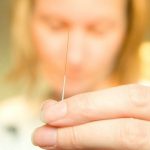
The aim of a new meta-analysis published today in Acupuncture in Medicine was to estimate the clinical effectiveness and safety of acupuncture for amnestic mild cognitive impairment (AMCI), the transitional stage between the normal memory loss of ageing and dementia.
Note: Readers may also be interested in the other Mental Elf blogs on mild cognitive impairment.
Methods
Randomised controlled trials (RCTs) of acupuncture versus medical treatment for AMCI were identified using six electronic databases.
Five RCTs involving a total of 568 subjects were included. The methodological quality of the RCTs was generally poor.
Results
Participants receiving acupuncture had better outcomes than those receiving nimodipine with greater:
- Clinical efficacy rates (odds ratio (OR) 1.78, 95% CI 1.19 to 2.65; p<0.01),
- Mini-mental state examination (MMSE) scores (mean difference (MD) 0.99, 95% CI 0.71 to 1.28; p<0.01), and
- Picture recognition score (MD 2.12, 95% CI 1.48 to 2.75; p<0.01).
Acupuncture used in conjunction with nimodipine significantly improved MMSE scores (MD 1.09, 95% CI 0.29 to 1.89; p<0.01) compared to nimodipine alone.
Three trials reported adverse events.
Conclusion
The authors concluded that:
Acupuncture appears effective for AMCI when used as an alternative or adjunctive treatment; however, caution must be exercised given the low methodological quality of included trials. Further, more rigorously designed studies are needed.

The press release of this study hails the “promising findings” of this research team, but are the claims of the authors justified?
Commentary
Meta-analyses like this one are, in my view, perfect examples of the ‘rubbish in, rubbish out’ principle of systematic reviews. This may seem like an unfair statement, so let me justify it by explaining the shortfalls of this specific paper.
RCTs cannot tell us if acupuncture is safe
The authors try to tell us that their aim was “to estimate the clinical effectiveness and safety of acupuncture…” While it might be possible to estimate the effectiveness of a therapy by pooling the data of a few RCTs, it is never possible to estimate its safety on such a basis.
To conduct an assessment of therapeutic safety, one would need sample sizes that go two or three dimensions beyond those of RCTs. Thus safety assessments are best done by evaluating the evidence from all the available evidence, including case-reports, epidemiological investigations and observational studies.
The authors tell us that “two studies did not report whether any adverse events or side effects had occurred in the experimental or control groups.” This is a common and serious flaw of many acupuncture trials, and another important reason why RCTs cannot be used for evaluating the risks of acupuncture. Too many such studies simply don’t mention adverse effects at all. If they are then submitted to systematic reviews, they generate a false positive picture about the safety of acupuncture.
The absence of adverse effects reporting is a serious breach of research ethics. In the realm of acupuncture, it is so common, that many reviewers do not even bother to discuss this violation of medical ethics as a major issue.

The absence of adverse effects reporting, so common in acupuncture research, is a serious breach of research ethics.
Acupuncture: totally devoid of therapeutic effects
The authors conclude that acupuncture is more effective than nimodipine. This sounds impressive – unless you happen to know that nimodipine is not supported by good evidence either. A Cochrane review provided “no convincing evidence that nimodipine is a useful treatment for the symptoms of dementia, either unclassified or according to the major subtypes – Alzheimer’s disease, vascular, or mixed Alzheimer’s and vascular dementia” (Birks et al, 2002).
The authors also conclude that acupuncture used in conjunction with nimodipine is better than nimodipine alone. This too might sound impressive – unless you realise that all the RCTs in question failed to control for the effects of placebo and the added attention given to the patients. This means that the findings reported here are consistent with acupuncture itself being totally devoid of therapeutic effects.
Unfounded claims
The authors are quite open about the paucity of RCTs and their mostly dismal methodological quality. Yet they arrive at fairly definitive conclusions regarding the therapeutic value of acupuncture. This is, in my view, a serious mistake: on the basis of a few poorly designed and poorly reported RCTs, one should never arrive at even tentatively positive conclusion. Any decent journal would not have published such misleading phraseology, and it is noteworthy that the paper in question appeared in a journal that has a long history of being hopelessly biased in favour of acupuncture.
Chinese published research on acupuncture: almost always positive
Any of the above-mentioned flaws could already be fatal, but I have kept the most serious one for last. All the 5 RCTs that were included in the analyses were conducted in China by Chinese researchers and published in Chinese journals. It has been shown repeatedly that such studies hardly ever report anything other than positive results; no matter what condition is being investigated; acupuncture turns out to be effective in the hands of Chinese trialists. This means that the result of such a study is clear even before the first patient has been recruited. Little wonder then that virtually all reviews of such trials (and there are dozens of them) arrive at conclusions similar to those formulated in the paper before us.
As I already said: rubbish in, rubbish out!

Poor reporting of weak evidence harms patients.
Links
Primary paper
Xu-Feng W. et al (2016) Acupuncture for amnestic mild cognitive impairment: a meta-analysis of randomised controlled trials Acupuncture in Medicine doi 10.1136/acupmed-2015-010989
Other references
Birks J, López-Arrieta J. (2002) Nimodipine for primary degenerative, mixed and vascular dementia. Cochrane Database of Systematic Reviews 2002, Issue 3. Art. No.: CD000147. DOI: 10.1002/14651858.CD000147.

Acupuncture for mild cognitive impairment: rubbish in, rubbish out https://t.co/kZJLbtviBS #MentalHealth https://t.co/3oPjk1DRsK
@Mental_Elf @tombennett71 yeah, just go straight to ECT eh?
@sisterofmurphy @Mental_Elf I suspect there are points between these poles
Hi @sarahknapton Read your piece on #acupuncture in @Telegraph https://t.co/K0pN4sDWvB Pls see @EdzardErnst here https://t.co/1cEBGqYOBV
This evidence is biased & misleading
Pls read @EdzardErnst blog on this study
https://t.co/1cEBGqHddl
#acupuncture https://t.co/d6UMdfx26H
Welcome to the woodland @EdzardErnst
New blog: #Acupuncture for mild cognitive impairment
https://t.co/1cEBGqYOBV https://t.co/5nXf7GB13j
@Drugscom This evidence is biased & misleading
Please read @EdzardErnst blog on this study https://t.co/1cEBGqYOBV
#acupuncture
@mdsdaily This evidence is biased & misleading
Please read @EdzardErnst blog on this study https://t.co/1cEBGqYOBV
#acupuncture
Hi @senseaboutsci @NHSNewsUK
Pls read @EdzardErnst
#Acupuncture for #Dementia precursor
https://t.co/1cEBGqYOBV https://t.co/vIC9ElA0y9
RCTs cannot tell us if acupuncture is safe
Debut Mental Elf blog from @EdzardErnst
https://t.co/1cEBGqYOBV
“Acupuncture for mild cognitive impairment: rubbish in, rubbish out https://t.co/UDseiC1Sbt
#Acupuncture for mild cognitive impairment https://t.co/v5FSDKjViD @Mental_Elf on a review with little #evidence & #unfounded conclusions
.@EdzardErnst shines a light on unfounded claims published today on #acupuncture for #dementia precursor https://t.co/1cEBGqYOBV
I am no advocate of acupuncture but this assessment of the paper is really quite unbalanced
In what way?
The eurocentric views about Chinese publications, where the paper is published, the incorrect view about assessing harms, the fact that its easy for the writer to check publication bias themselves…I could go on
Pr Keith Laws,
Very courageous French GPs fought up to the French Justice courts against blatant conflicts of interest in favor of unproven anti-Alzheimer drugs which are costly in terms of money and very painful in terms of side-effects against our equivalent of NICE (The HAS) :
http://www.formindep.org/Communique-La-HAS-retire-egalement.html
If anyone in his sixty or older were to ask me about acupuncture for mild cognitive problems which don’t seem to me serious or peculiar enough to think of any neurological or psychiatric diagnosis but resist reassurance, I would be happy to approve the use of a MD acupuncture clinic provided needles are used only once, the price is reasonable and the promises of cure isn’t crooky because I have known enough worried well people becoming victims of over-diagnosis and over treatment with dangerous side-effects or victims of crooks working completely outside any physician ’s knowledge.
Your own work against less soft targets, by far, than acupuncture and alternative medicine in general, for examples CBT for psychosis should have set set a scientific and moral standard in assessing any talking therapy or alternative medicine therapy but it won’t happen soon for the later since moderate opinions-be it con or pro-are seldom allowed in the field of alternative medicines and this author provides any shallow-minded admirer of his with the comforting delusion of being an intelligent advocate for science against obscurantism. Who cares for your rigor in analysis and perspective in analyzing results when the devil of alternative medicine is to be annihilated? Why bother to mention, for perspective, the real EBM of anti-Alzheimer drugs and the knowledge of their disastrous side effects which seem both even worst than those of SSRI antidepressant for that matter- when negative studies are taken into account and full data are released ?
I for one came to the educated conclusion -based on an intensive 8 months of work on a clinical protocol to study homeopathy as a researcher in Pr Claude Chastang ’s department in 97/98- and many years of supporting « worried well » French people that alternative therapies have so far not more nor less scientific credentials than any talking therapy, mindfulness and positive psychology, you name it. Besides, I can’t see how honest, intelligent and highly educated psychologists or physicians can be in favor -or timid in their critics of – CBT or psychoanalysis( in its new clothes of Northern Europe making called « Open dialogue ») for life threatening problems like psychosis and schizophrenia but deny any usefulness to alternative therapies for mild problems when the scientific shortcomings in offered evidence for CBT or « open dialogue » are similar in their aspects and magnitude to those of alternative therapies? That something has to be offered for patients with schizophrenia and psychosis in addition to drugs or when drugs fail is a frequent justification of unproven talking therapies but few people would admit this reasoning is as valid or invalid for alternative therapies.
To give a short read and an interesting video examples of the intellectual quality and integrity of your work and courageous teaching: http://keithsneuroblog.blogspot.fr/2016/01/science-is-other-correcting.html and »CBT for psychosis the science and politics » https://www.youtube.com/watch?v=mke0moXdKuI
To give a concrete example of dangerous bias of alternative therapy like acupuncture or homeopathy haters can be : An Australian new mother died after giving birth at home -in a small plastic swimming pool in a room with little lighting – of undiagnosed hemorrhage until too late for the woman to survive it. The victim was anti-obstetricians like other are anti-psychiatrists but those biased anti-homeopathy haters only accused the small amount of homeopathy a « birth at home » midwife administered in addition to allopathic drugs without acknowledging the deadly fact that the « home birth midwife » called an ambulance too late for any obstetrician to practice a live-saving emergency hysterectomy or whatever and blood transfusions saving the woman’s life. Not to mention the huge risks taken by the victim who had chosen to refuse any obstetrical following during pregnancy and home birth nonobstant a hemorrhage incident in a previous child birth in hospital and had neglected to inform the birth at home midwife of this previous hemorrhage complication during birth…
https://www.theguardian.com/australia-news/2016/mar/24/midwife-may-face-criminal-charges-after-mother-dies-following-home-birth
http://brodiesnotes.blogspot.fr/2016/03/maternal-death-in-australia-was.html
The absence of adverse effects reporting, so common in acupuncture research, is a serious breach of research ethics https://t.co/1cEBGqYOBV
And what could be the side-effects of rather superficial punctures using sterile needles apart infection which can be prevented when the material is used only once ?
On the other hand, I for one have witness in patients and carers the huge physical distress caused by inefficient and very costly supposed anti-Alzheimer drugs which haven’t been proven to be superior to placebo for efficacy but for sure can cause digestive side-effects much closer to those of anti-cancer drugs than to alternative medicine side-effects…
So far the scientific evidence against alternative medicine is that crooks or delusional practitioners can deprive patients of unbiased EBM active treatments for serious diseases.
Intellectual honesty should have make the author to mention that crooks and delusional practitioners are overselling many electronic gadget and unproven costly Pharma drugs when tackling without too much rigor the use of acupuncture for mild cognitive impairment.
Precision: The huge physical distress of a spouse living at home alone many hours in 24 hrs with a patient suffering from Alzheimer and in addition from diarrhea due to supposed anti-Alzheimer pills shouldn’t be underestimated. It is physically tiring for carers as well as emotionally draining to deal with messy diarrhea and vomiting especially in incontinent patients or when dizziness is an added side-effect.
Retweeted The Mental Elf (@Mental_Elf):
.@EdzardErnst shines a light on unfounded claims published today on… https://t.co/bltsVpo4En
Great blog on #acupuncture for MCI by @EdzardErnst today
https://t.co/1cEBGqYOBV
Read more from him here:
https://t.co/olH9rUb4jS
Poor reporting of weak evidence harms patients
Read @EdzardErnst on #acupuncture
https://t.co/1cEBGqYOBV https://t.co/XIYkqkejQW
Don’t miss!
#Acupuncture for mild cognitive impairment
Rubbish in, rubbish out
@EdzardErnst
https://t.co/1cEBGqYOBV https://t.co/bvQm5PAmh1
Most popular blog this week?
It’s @EdzardErnst
#Acupuncture for mild cognitive impairment: Rubbish in, rubbish out
https://t.co/1cEBGqYOBV
+”I am no advocate of acupuncture but this assessment of the paper is really quite unbalanced” https://t.co/GSc9wmJQ1D @Mental_Elf
[…] Acupuncture for mild cognitive impairment: rubbish in, rubbish out […]